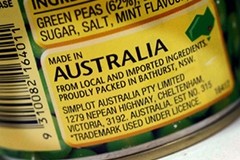Urgency needed to reform Australian food sector, says AFGC

The Senate Select Committee on Australia’s Food Processing Sector completed its year-long inquiry into challenges and pressures facing the sector and published its findings and recommendations on August 16.
Gary Dawson, chief executive of AFGC, welcomed the “comprehensive” report but noted “there is a real urgency for getting on with the job”.
“There’s no doubt that global demand for food is accelerating, the question is whether we have the right programs in place to ensure Australian food manufacturing shares in, and profits from, that growth,” Dawson said.
Sparking change amid complexities
In its final report, the Senate said: “The committee takes the view that its report should inform the development of the National Food Plan (particularly in the areas of research and development, access to export markets, biosecurity and food labelling, quality and safety) which will set out Australia's integrated food policy.”
Dawson said the AFGC looks forward to working with Parliament on implementing practical policies and initiatives to support the food industry, especially in developing further the National Food Plan.
The Senate acknowledged pressures that have impacted the industry including a strong Australian dollar, rising input costs and the carbon tax and acknowledged that the challenges are complex.
“The conditions facing the sector at this point in time could be described as the perfect storm; however, this view is not shared by all. Treasury take the view that the wider economy is in the midst of a structural change and that this change is impacting many sectors, not just food processing,” it said.
Calls for a multifaceted, innovative and collaborative response from industry and government to push the sector forward and take advantage of opportunities were made in the report.
Listed recommendations
In total, 35 recommendations were made including streamlining regulatory arrangements on tax, infrastructure and food regulatory requirements across the states and territories, ensuring fair trading throughout the supply chain, improving country of origin labelling and driving food exports through bilateral trade agreements.
Dawson welcomed all the above and said that “concerted action to enhance the competiveness of companies across the sector is vital”.
Investment in innovation will prove critical as a foundation to improving competitiveness, he said.











